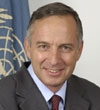Leading Figures in International Law
 Nicolas
Michel
Nicolas
Michel
To be appointed as Under-Secretary General for Legal Affairs and Legal Counsel for the United Nations, one must be able to provide interpretation, analysis, and advice on questions of international law for 192 nations. This may seem like a daunting professional challenge to some, but not for Nicolas Michel, a leading international figure in international law.
Long before his appointment at the United Nations, Nicolas
Michel’s career as a lawyer began after he had earned a
doctorate at the University of Fribourg in 1979 and was
admitted to the bar in 1980. From 1980 to 1985, Michel served
as the Secretary-General of the Department of Education
and Culture of the canton of Fribourg,
In 2003, he served inter alia as the chair of the Drafting Committee of the International Conference on “The Missing” in Geneva, and in 2000 on the Consultation and Preparatory Meeting on a Third Protocol to the Geneva Conventions (Emblems). He also acted as the head of the Swiss delegation for the presentation of national reports before international committees on racial discrimination, rights of the child and minorities. In March 2004 Michel was the Chairman for the Workshop on Article 51 of the United Nations Charter in Light of Future Threats to International Peace and Security in Geneva, a contribution to the High-Level Panel on Threats, Challenges and Change.
As Under-Secretary General, Nicolas Michel has played a
critical role in advancing the international rule of law
at the international, national, and organizational level
as well as in the campaign to end impunity for perpetrators
of crimes against humanity. In an open debate before the
Security Council in 2006, Under-Secretary Michel implored
that “Justice should never be sacrificed by granting amnesty
in ending conflicts,” adding that justice and peace should
be considered as complementary demands and that the international
community should “consider ways of dovetailing one with
the other.”[1] Michel has been
heavily involved in working to support the establishment
and functioning of the International Criminal Court
(ICC) and other ad hoc criminal tribunals, such as those
for the former
In October of 2007, Michel was appointed to the selection
panel for the new Special Tribunal for
Within his very own organization, Under-Secretary Michel has shown a dedication toward setting international human rights standards and promoting the rule of law at all levels in the UN’s internal justice system, and has called for the creation of an international convention on criminal accountability of UN officials stating: “criminal conduct by UN personnel puts into question the core values of the Secretariat and directly affects the world body’s activities and “essential mission.” To absolve jurisdictional problems in the short term, Under-Secretary Michel encouraged member states at the Sixty-Second General Assembly Session to prosecute their nationals accused of committing crimes while on UN missions.
Mr. Michel still serves as the Legal Adviser for the Swiss Federal Department of Foreign Affairs and is Chairman of the Committee of the Legal Advisors on Public International Law of the Council of Europe (CAHDI). Michel received the annual Award for Distinction in International Law and Affairs from the International Law and Practice Section of the New York State Bar Association in January 2006. “With the many difficult issues facing our world and the United Nations, including genocide, terrorism and corruption, Mr. Michel’s efforts to support resolutions to address these problems and his respect for the rule of law make him immensely deserving of this award,” said Robert J. Leo of Manhattan (Meeks & Sheppard), chair of the International Law and Practice Section.
Originally appointed by former
Secretary-General Kofi Annan in May 2004, Michel stepped
down from his position at the end of August 2008 and has
been replaced by Patricia O’Brien
of
By Veronica Onorevole, co-editor, International Judicial Monitor, American Society of International Law
[1] UN Security Council Press Release, June 22, 2006, 5474th meeting
